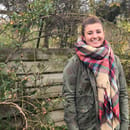Metcalfe Park Legacy Garden
Metcalfe Park Legacy Garden in Milwaukee is an urban farm, and it has transformed several vacant lots into a space for community gatherings and education. The urban garden is overseen by the Metcalfe Park Community Bridges organization and GroundWork Milwaukee, which provides money for neighborhood kids to work on the garden in the summer.
As you drive through the community, the history of segregation, displacement, and removal is clearly defined by empty, crumbling factory buildings and dismal houses with boarded windows. But the garden provides hope of a changing racial and cultural dynamic in Milwaukee. Metcalfe Park Legacy Garden demonstrates resistance, culture, perseverance, and growth. Although the predominantly black (90 percent) neighborhood holds a history of displacement and relocation, it also tells the story of renewal and regeneration — a story that Lands We Share aims to tell.
Lands We Share Community Dinner
The Lands We Share exhibit prompted visitors with a series of questions relevant to the community and provide an opportunity for visitors to submit questions or ideas that would inspire further conversation. One topic of discussion was how the history of farming shaped a family’s or community’s sense of identity? If so, how?
“My memories are gardening with my grandmother in urban Milwaukee,” said one woman. “The Metcalfe garden allows children who wouldn’t have that experience to come together with older generations and work side-by-side.”
Another woman said that it shapes values and beliefs such as teamwork and taking care of the land because the land is where your food comes from. A gentleman mentioned that this garden gives exposure to those who have no history of farming.
The second question of the evening was how important locally produced food is to the health of family and neighborhood?
“Our community [Metcalfe Park] doesn’t have options, gardening gives us options,” said Danell Cross, director of Metcalfe Park Community Bridges when talking about buying food from grocery stores, many of which are located so far, residents struggle to get there.
The dinner featured locally sourced vegetables — produce that Metcalfe residents are excited to start purchasing this summer from the Young Cats, a program for young students working in the garden.
One woman explained that gardening is an act of independence. It allows the community to take charge of their food supply, educate their youth, and keep money in the community. Guests also pointed out that growing food teaches the kids to wait and be patient because it takes time for things to grow.
“The garden allows me to help my community and myself at the same time,” said a Young Cat member.
Although the dinner is over, the exhibit is at the Wisconsin Black Historical Society in Milwaukee through March 1, 2019, and it’s free and open to the public. The final gala is on May 16th at the Madison Public Library.
The Wisconsin Farms Oral History Project was designed to give a voice back to farmers, and currently has a collection of over 350 interviews. A few years ago, the team decided that it was time to make use of the oral history interviews by creating a traveling exhibit and conversation tour called the Lands We Share.
For more information, you can visit the Lands We Share website.
If you’d like to hear an oral history segment with Metcalfe Park Community Bridges director, Danell Cross, listen to this interview.


